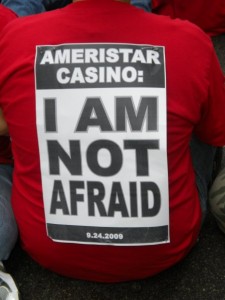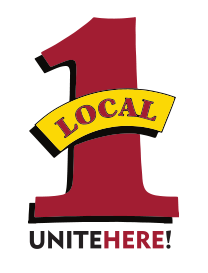Ameristar workers appear before Indiana Gaming Commission on “part-timer” crisis
Workers call for investigation of growing state tax burden from staff cuts in one of Indiana’s most profitable industries
 (Indianapolis, IN) – Workers from Ameristar casino in East Chicago traveled to the State Capitol today to appear before the Indiana Gaming Commission to raise concerns about the casino’s increasing reliance on part-time workers, despite Ameristar awarding more than $10 million on bonuses and stock awards to its top corporate officials. Workers testified to the personal impact of Ameristar aggressively cutting worker hours and the tax burden to the state when employees lose income and health benefits due to their part-time status. Workers called on the Indiana Gaming Commission to investigate how many Ameristar employees have enrolled in any public assistance programs as a result of having been shifted from full-time to part-time status.
(Indianapolis, IN) – Workers from Ameristar casino in East Chicago traveled to the State Capitol today to appear before the Indiana Gaming Commission to raise concerns about the casino’s increasing reliance on part-time workers, despite Ameristar awarding more than $10 million on bonuses and stock awards to its top corporate officials. Workers testified to the personal impact of Ameristar aggressively cutting worker hours and the tax burden to the state when employees lose income and health benefits due to their part-time status. Workers called on the Indiana Gaming Commission to investigate how many Ameristar employees have enrolled in any public assistance programs as a result of having been shifted from full-time to part-time status.
“After 13 years of service, Ameristar cut me to part time and I lost my benefits,” says Christinia Davis, a Buffet Server at Ameristar Casino, who has racked up more than $100,000 in medical bills from recent major surgery. “I’m proud to say that I haven’t had to rely on state aid for more than a decade now because of this job, but with my part-time status that may all change.”
Christinia is just one of many area casino workers who has seen her hours cut in recent months. 30% of the unionized staff at Ameristar are now working part-time and are not eligible for health benefits. The average buffet beverage server at Ameristar currently makes $9.85 an hour, meaning an employee who works part-time at 28.5 hours a week at part-time status, has a gross annual income of $14,598. At that level, one would fall below the federal poverty line as a head of a two-person household and qualify for Temporary Aid to Needy Families (TANF) and Hoosier Healthwise, Indiana’s health insurance program for low-income families.
By contrast, Ameristar’s top executives have done well in recent months, and freely admit their intent to rely more and more on part-time workers to boost corporate profitability.
“We’ve made a big shift from full-time to part-time labor, which gives us a lot more flexibility in scheduling,” said Gordon Kanofsky—an Ameristar CEO and Vice Chairman, who earned $3,836,470 in total compensation in 2009—on an earnings call with investors.
The Indiana Gaming Commission is charged with regulating and issuing licenses to Indiana riverboats, on the premise that these casinos “promote the most economic development in a home dock area,” that “best serve the interests of the citizens in Indiana.” Casino workers called on Commission members to assess whether Ameristar still meets that criteria by investigating the negative economic impact and tax burden of Ameristar’s reliance on part-time workers.
“When gaming came to East Chicago over a dozen years ago, these casinos were supposed to provide good jobs to replace the ones that were moving overseas,” says Jami Peterson, a bartender at Ameristar East Chicago. “Instead, my coworkers are going to the state to get food stamps, partial unemployment or healthcare.”
Workers from Ameristar available for interview.
# ##




